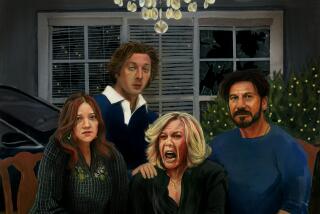STAGE REVIEW : SERVING UP AN UPPER CRUST IN A WASP ‘DINING ROOM’
- Share via
When we eat in the dining room, we sit up straight. We do not bolt our food or kick our little sister under the table. We discuss pleasant subjects of general interest--not how Raymond stuffed a snake down Susan’s back. And when we are finished, we fold our napkin and ask to be excused.
In the dining room we make a conscious effort. At the same time, we enjoy our meal. If this sounds like your father, you will appreciate what A. R. Gurney Jr. is up to in “The Dining Room” at the L.A. Public Theatre. You may also wish that director John Frank Levey and his cast had as firm a grasp of what they were up to.
“The play takes place in a dining room--or rather many dining rooms--over the course of many years,” Gurney writes. It is a formal dining room with swinging doors for the maid, a colder room than “modern living” calls for. In the first scene, a real-estate agent and a customer agree that it won’t do.
Left alone, the dining room reverts to its memories, and we see some of the scenes that have been played out here during the years. Not that people with manners allow themselves to have “scenes” in dining rooms. There are other rooms for that. But momentous things have happened here, in their quiet way.
This is where Grandfather said I could go away to school. This is where Daddy said I couldn’t come home to live. This is where we realized that Grandmother needed help. This is where I saw that Mother hated Aunt Harriet. This is where Father swore vengeance on Winky Brewster.
The last is a perfect encapsulation of Gurney’s view of his characters, half-satirical, half-admiring. On the one hand, Father looks a little ridiculous, galloping off on a mission of clan honor. (It seems that Winky has made a crack down at the club about Father’s brother and his “bachelor attachments.”)
On the other hand, the children will never forget how awed they were by Father’s bravery. And how impressed they were by Father’s reasoning--that even if such a charge were true, it is nothing that you bring up at a man’s club.
Levey’s actors make a gallantly absurd tableau, clinging to Ethan Phillips as balding Father, who will certainly get the worst of it from Winky. Here “The Dining Room” finds the delicate comic balance that Gurney put into it.
But delicacy is not a mark of this production. Director Levey and his actors don’t do anything that is dreadfully wrong. But nothing they do is definitively right either. They simply don’t know these characters (upper-level WASP) as thoroughly as Gurney does.
For instance, in an early scene, the mistress of the house is tired of waiting for her breakfast. This is how she makes her annoyance known to the maid: “I wonder if something might have happened to those poached eggs, Annie?” The words are innocent but the tone tells Annie that those eggs had better be there quickly.
Actress Annabella Price reads the line, and only establishes that she’s not comfortable giving orders to anyone. In those vignettes in which she plays a child or teen-ager (the cast of six has to assume many faces and ages) she’s much closer to the mark. But in general we don’t sense an ease in this kind of dining room.
Conversely, James Ray is at ease as a father huffing at his morning paper, but has trouble playing a child--he’s several lines into one scene with Joyce Van Patten as the maid before you realize that he’s not playing the hired man.
Van Patten is fine in the servant roles, and not bad as the doddering grandmother, but something proletarian keeps coming through. Lauren Tewes comes closer to the fine-boned WASP look, but seems easier playing silly mothers than subtle ones.
Of the men, Dennis Dugan looks the most like a Yankee--but is pretty much the same Yankee in every scene. Phillips, less right physically, emerges as the one actor with the variety to put us in touch with a number of different characters, all acclimated to the folkways of the dining room.
The physical production looks solid, but again trips up on details--and the world of “The Dining Room” lives on details. D. Martyn Bookwalter’s set, for instance, isn’t well painted, particularly not the baseboards. Barbara Ling’s lighting fails to distinguish between the room’s bleak present and its living past.
There’s wonderful writing in this play--good enough to carry it, even with mediocre performances. But as Father always said, “In this family, good enough won’t do.” From the theater we want excellence. This show doesn’t deliver it.
Performances are Tuesdays-Saturdays at 8 p.m., Sundays at 7:30, with Sunday matinees at 2, 366 N. La Cienega Blvd., 659-6415.
More to Read
The biggest entertainment stories
Get our big stories about Hollywood, film, television, music, arts, culture and more right in your inbox as soon as they publish.
You may occasionally receive promotional content from the Los Angeles Times.










